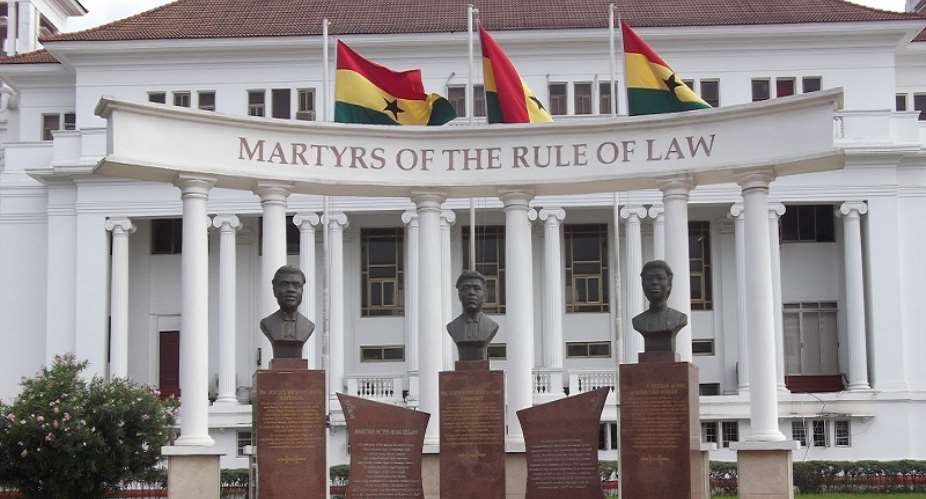Ghana’s Supreme Court has ruled that it is unconstitutional for the General Legal Council to make it mandatory for LLB holders to write entry examinations as well as pass an interview before they are admitted to pursue their professional careers in law.
A seven-member panel of the apex court headed by Justice Jones Dotse Thursday reached the unanimous decision in an application brought before it by US-based law Professor Kwaku Asare.
He was challenging the mode of admission of law students into the Ghana Law School, the constitutionality of the General Legal Council’s imposition of new admission requirements for the professional course and also the constitutionality of the General Legal Council’s policy on reviewing examination scripts and quota admissions system.
The Supreme Court panel said the basic requirements stipulated by the law that regulates the establishment of the law school LI 1296, requires that an applicant to the school should have passed specific seven subjects during the LLB program, be of good behaviour and hold an LLB degree to be admitted into the Ghana School of Law. The writing of an entry exams and passing an interview are not part of the requirements in the LI 1296.
The Supreme Court panel also ordered that the General Legal Council should take steps within the next six months to implement the orders of the court. It also declared that the judgement of the court does not take retrospective effect, but rather takes a prospective effect. It also edged the GLC to introduce a quota system for the admission of students by accredited law school faculties to present the huge numbers of LLB holders who get turned out from the faculties.
Background
On October 15, 2015, Prof Asare filed a suit against the GLC and set up four issues for the Court to determine: 1. Whether the General Legal Council’s imposition of new admission requirements for the professional course violates Articles 11(7), 297(d), 23, and 18(2) of the 1992 Constitution?
2. Whether Regulation 3(b) of LI 1296 is void-for-vagueness and is therefore facially unconstitutional and whether the General Legal Council unconstitutionally applied it to disqualify eligible students who had qualified for admission to pursue the Professional Law Course?
3. Whether the General Legal Council’s failure to specify alternative places and modes of instruction for all persons who meet the requirement in Regulation 2 of LI 1296, when taken in light of Section 13 of ACT 32, violates Articles 296(a)(b) and 297(b) of the 1992 Constitution?
4. Whether the General Legal Council’s policy on reviewing examination scripts and quota admissions violate Articles 23, 296(a)(b) and 18(2) of the 1992 Constitution?
While the Court’s rules required the AG and GLC to have responded by October 29, 2015, they responded on January 28, 2016 and April 14, 2016 respectively. In response to the delayed Statement of Defenses, Prof. Asare, pursuant to leave granted by the Court, filed an amended statement of case on June 15, 2016. On 28th July 2016, the Court denied the plaintiff’s application to stop the GLC from holding the 2016 entrance examination.
Notwithstanding the denial of the injunction, the substantive case was not called till February 9, 2017, when the case was adjourned till March 14, 2017 when the GLC announced that it had filed an amended Statement of defense, 9 clear months after the Plaintiff’s amended statement of case.





 Saglemi Housing Project will not be left to rot – Kojo Oppong Nkrumah
Saglemi Housing Project will not be left to rot – Kojo Oppong Nkrumah
 Transport fares hike: GPRTU issue two-day ultimatum
Transport fares hike: GPRTU issue two-day ultimatum
 ARC endorses Alan as presidential candidate – Buaben Asamoa
ARC endorses Alan as presidential candidate – Buaben Asamoa
 Akufo-Addo appoints Kwasi Agyei as new Controller and Accountant-General
Akufo-Addo appoints Kwasi Agyei as new Controller and Accountant-General
 PNC dismiss reports of mass resignations
PNC dismiss reports of mass resignations
 PAC advocates for revenue collectors to be engaged on commission basis, not full...
PAC advocates for revenue collectors to be engaged on commission basis, not full...
 Genser Energy commissions 110km of natural gas pipeline at Anwomaso
Genser Energy commissions 110km of natural gas pipeline at Anwomaso
 Naa Torshie calls for tolerance, peace ahead of 2024 election
Naa Torshie calls for tolerance, peace ahead of 2024 election
 Asantehene commends Matthew Opoku Prempeh for conceiving GENSER Kumasi Pipeline ...
Asantehene commends Matthew Opoku Prempeh for conceiving GENSER Kumasi Pipeline ...
 Let’s do away with ‘slash and burn politics’ in Ghana — Dr Adutwum
Let’s do away with ‘slash and burn politics’ in Ghana — Dr Adutwum
